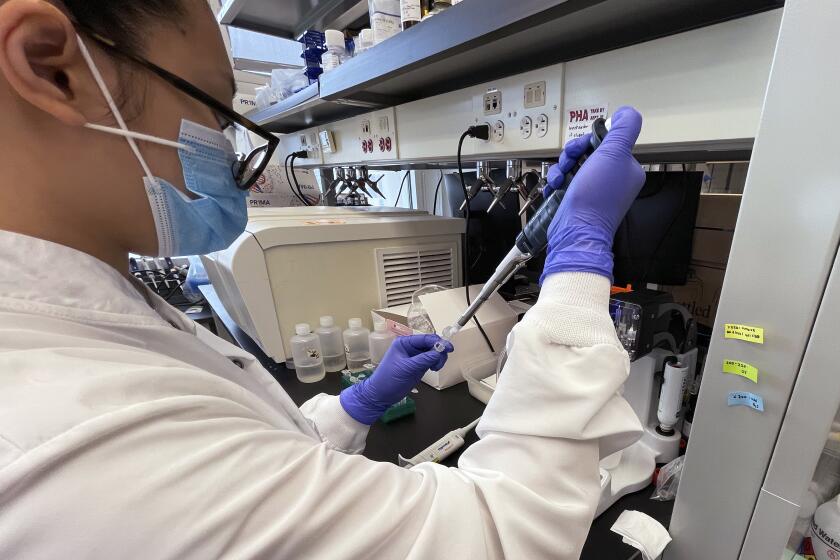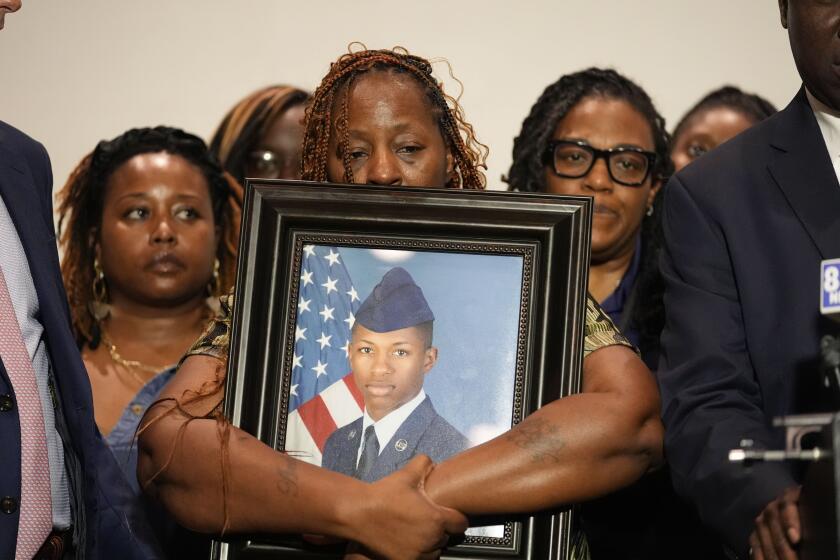Ex-Cons Run for Assembly in N. Ireland
Prison time has rarely been a liability in Northern Ireland politics, but the fact that 20 or so ex-cons are candidates in today’s election for a new government here has raised some hackles and reopened old wounds.
To many supporters of the Good Friday peace accord, the campaigns of former Irish Republican Army commanders and Protestant gunmen convicted of murder are a sign of the agreement’s success: These militants are being drawn away from violence and into a democratic political system.
To others, however, the former fighters are wolves in sheep’s clothing, unrepentant “terrorists” and “mass murderers” who should not hold public office.
“While I was campaigning the other day, one woman started crying on the doorstep,” said Patricia Campbell, an Ulster Unionist Party candidate. “She had lost three people to the Troubles and couldn’t accept what’s happening. I told her that all politicians can do now is try to ensure that this will never happen again.”
Campbell is running for a seat in the 108-member Northern Ireland Assembly in the same district as Joe Cahill, onetime Belfast commander of the IRA. Cahill was sentenced to hang for the killing of a police officer in 1942 and would have died along with his cellmate if Washington and other powers had not intervened to save his neck.
Also among the candidates with criminal pasts are: Gerry Adams, leader of Sinn Fein, the political wing of the IRA, and elected member of the British Parliament for West Belfast, who spent time in jail for belonging to a banned organization; Gerry Kelly, sentenced to life in prison in 1973 for placing an IRA car bomb at London’s Old Bailey courthouse; Billy Hutchinson of the Progressive Unionist Party, a Protestant who served 15 years of two life sentences for murdering two Catholics; and John White of the Ulster Democratic Party, who served 14 years for murdering a Catholic politician and his Protestant girlfriend.
David Ervine, leader of the Progressive Unionist Party, who has worked hard to win Protestant support for the power-sharing peace agreement, served four years in prison for transporting a bomb.
That was enough to keep one old school chum from voting for him. “David is a friend of mine,” said the Belfast Protestant, a plasterer by trade who calls himself a pro-British unionist. “But I find it hard to stomach having people [of] violence in government, especially with guns still under the table. A lot of people are uncomfortable with that.”
The IRA and Protestant paramilitaries have declared cease-fires, and the peace accord calls for political parties to work for the “decommissioning” of weapons.
But an IRA splinter group exploded a car bomb in the southern town of Newtownhamilton on Wednesday, injuring two people and causing extensive damage.
Seamus Mallen, a leader of the nationalist Social Democratic and Labor Party, said the explosion next to what would have been a polling station in today’s election was “an attack on the entire political process.” It also seemed intended to stir up doubts about the sincerity of those who have laid down their arms for ballot boxes.
The Rev. Ian Paisley, leader of the Democratic Unionist Party, opposes the peace agreement and does not trust the IRA’s cease-fire or Sinn Fein’s commitment to peaceful politics.
Paisley is another candidate who did time in jail--six weeks in the late 1960s for unlawful assembly after he blocked a Catholic civil rights march. His time behind bars has been commemorated in a stained-glass window in his Martyr’s Memorial Church. But as far as Paisley is concerned, the murder convictions of people such as Cahill make them unfit for public life.
“He should have been hung up years ago. He ought not to be there,” Paisley said of Cahill.
But Cahill is an IRA folk hero to Catholic nationalists who want the North united with the Irish Republic. They have no trouble sending someone like him to government, having elected the hunger-striking IRA prisoner Bobby Sands to the House of Commons in 1981 and, more recently, Adams and Martin McGuinness. Sands never lived to take his seat, and Adams and McGuinness have refused to take theirs as a protest to British rule.
As for Cahill, he is a small, round figure in an argyle sweater and tweed jacket who looks more like Popeye’s hamburger-eating friend Wimpy than he does a hardened guerrilla. Admirers describe the father of seven and grandfather of 12 as having a twinkle in his eye.
But Cahill also spent a total of 15 years in jail for murder, running guns from Libya, illegal border crossings into the United States and other activities linked to the IRA’s campaign of violence against British rule in Northern Ireland.
To supporters, Cahill is a symbol of the IRA’s march from its maximum position of no concessions until the British withdraw from Northern Ireland and the region is united with Ireland to a gradualist policy of pursuing these goals through peaceful and democratic means. He was key in supporting Sinn Fein’s move into politics and in persuading Irish Americans to go along with the shift.
“Our end goal is still the same--a united Ireland. If I can help in any way to achieve this goal, I will,” Cahill said as he canvassed this Catholic enclave in County Antrim on a misty afternoon.
Cahill says he has no problem with a peace deal that, in effect, legitimizes Northern Ireland’s union with Britain, at least in the short term. The agreement says that the union will remain intact unless a majority in Northern Ireland decides to change it. Cahill believes that this will one day happen and that, meanwhile, the two sides must work together.
“I believed all my life that eventually there would have to be talks,” he said. “But up to this time, there has not been an opportunity to talk. That is one of the big changes I see this time. People are prepared to talk.”
Not everyone. Even David Trimble’s Ulster Unionist Party, which negotiated the peace agreement with Sinn Fein through intermediaries, has yet to speak directly to any of the IRA ally’s leaders.
Patricia Campbell, the Ulster Unionists’ candidate running against Cahill and Paisley, is a 33-year-old Catholic and the daughter of a retired Royal Ulster Constabulary police officer. She describes the election as a battle between the past and the future, and, in that regard, sees her contenders on the same side.
“They both talk in terms from the past,” Campbell said. “They both talk about victory of one side over the other. They are divisive. Our campaign says that we can build a better future for all the people of Northern Ireland.”
Campbell, who smiles at the idea of a Catholic who wants to remain under the British flag, says it’s “too early to tell” whether bringing ex-cons into a new Northern Ireland government will bring peace to the province. “It is too soon to make a judgment,” she said.
More to Read
Start your day right
Sign up for Essential California for news, features and recommendations from the L.A. Times and beyond in your inbox six days a week.
You may occasionally receive promotional content from the Los Angeles Times.






